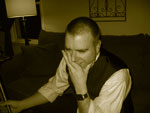Liar, Liar, or Inspired?
Michael Dean Clark
This is the third of four entries on “being” a writer. The first can be found here and the second here.
True story: when I applied to graduate school, I was asked why I wanted to pursue a Ph.D. I said it was because I wanted to be a better liar. I got in and four years later I am about to be awarded that degree.
I am, I think understandably, conflicted about this. In essence, people will now refer to me as “Dr. Clark” (a term I think will still indicate respect because I will never be an HMO-funded health care provider) and a university has entrusted me with students to influence because I achieved a dubious goal. I improved my ability to deceive.
Sure, sure, you can parse words and say “it’s not lying, it’s fiction.” But the best fiction carries that one key caveat: people want to believe it. Or, as Malcolm Muggeridge put it, “People do not believe in lies because they have to, but because they want to.”
A note before I continue – I love the lies of fiction, when they point toward a truth worth exploring. Lies expose truth, much as “the shadow proves the sunshine.” But, within me is an existential dilemma. How does one lie ethically without crossing over into James Frey territory or worse, begin to enjoy the lies more than the truth they point to?
Some might call this classical conditioning. Lies are a slippery slope that lead from Thomas Jefferson’s “He who permits himself to tell a lie once, finds it much easier to do it a second and third time, till at length it becomes habitual” to Austin O’Malley’s “Those who think it is permissible to tell white lies soon grow color-blind” to (with apologies to Stephen Swanson) Adolph Hitler’s “Make the lie big, make it simple, keep saying it, and eventually they will believe it.”
Lies, as we’ve all experienced personally, are a cage full of horny rabbits.
How then can one be “possessed by the truth” and a writer of good fiction? Again, I return to the views of people more intelligent than me. Some, like A.A. Milne, point with humor to the work that goes into lies with purpose when he wrote “If one is to be called a liar, one may as well make an effort to deserve the name.” Emerson went the sublime route, saying “Truth is beautiful, without doubt; but so are lies.” Some, like Clare Boothe Luce, take the pragmatic view: “Lying increases the creative faculties, expands the ego and lessens the frictions of social contacts.” Plato used reverse psychology (before reverse or psychology were in vogue) “They deem him their worst enemy who tells them the truth.”
Here’s my thought – fictional lies have limitations in spiritual truth. When they tie into the “greater than me,” they cease to be lies and become reflections of the walls of our caves. The argument could be made that this is transubstantiation of a sort. Inventions become actualities. This, of course, demands that one believe there is truth external of one’s own experience, a concept some consider as dated as high-waisted jeans on men. But I tend to agree with Karl Barth’s idea that “Man can certainly keep on lying…but he cannot make truth falsehood. He can certainly rebel…but he can accomplish nothing which abolishes the choice of God.” And when the presence of discoverable truth combines with the desire to find it, the lies of fiction make sense.
Michael Dean Clark is an author of fiction and nonfiction and is in the final stages of earning a Ph.D. in Creative Writing at the University of Milwaukee-Wisconsin. His work is set primarily in his hometown of San Diego and has been known to include pimps in diapers, heroin-addicted pastors who suffer from OCD, and possibly the chupacabra.
